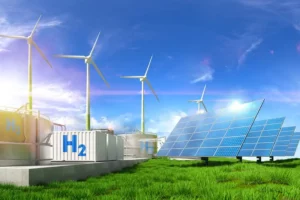On Wednesday, the Brazilian Development Bank (BNDES) and the Asian Infrastructure Investment Bank (AIIB) teamed up to invest in Brazil’s clean energy.
They’re targeting infrastructure, climate, trade, and connectivity enhancements.
Aloizio Mercadante, the BNDES President, noted Brazil’s G20-leading clean energy sector. He highlighted the goal of drawing more investment and boosting the industrial sector.
BloombergNEF reports BNDES as the top global financier of renewable energy, with about $35 billion lent from 2004 to 2022.
Luciana Costa, BNDES’s director, revealed the bank’s energy and infrastructure loans total nearly 280 billion reais ($50.6 billion).

“For 2023, we approved 20.4 billion reais for energy transition projects and disbursed 12 billion reais.
Our aim for 2024 is a 20% increase,” Costa shared. Despite Brazil’s low energy prices, her optimism for funding wind and solar projects remains strong.
She also sees great potential in exporting steel and green fertilizers, which would involve using low-carbon hydrogen.
A surge in green hydrogen projects might double Brazil’s 200 GW capacity, revolutionizing the sector.
BNDES supports the solar energy market, primarily through the Finem program and Fundo Clima.
Together with CAF and IFC, BNDES funded a multi-sector infrastructure credit fund launched by Pátria Investimentos in February.
Public banks, including Banco do Nordeste and Banco do Brasil, are crucial for solar project financing.
Private banks, like BTG Pactual and Santander Brasil, have also made significant energy investments.
Itaú BBA and others anticipate more financing in the energy and sanitation sectors.
Gustavo Andres from Itaú Unibanco mentioned specialized credit lines as the key to overcoming financial challenges.
Foreign entities like MUFG, KfW Group, and the IDB have significantly contributed to Brazil’s energy financing.
With an energy surplus, Brazil faces hurdles in new electric generation projects.
However, Marina Aidar from Demarest Advogados sees promise in self-supply renewable energy projects, spurred by ESG agendas.
An upcoming law could ease financing and offer tax incentives for distributed generation projects.
In short, the transmission sector remains appealing for its consistent demand for financing.

